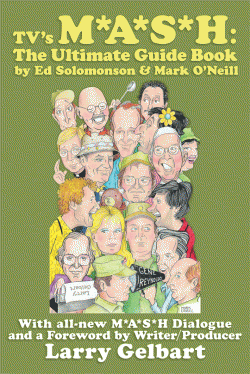About Ed Solomonson

The United States was still involved in Viet Nam when M*A*S*H aired on September 17, 1972, which was five months away from my 18th birthday and an appointment to register with the Selective Service System. I had started paying close attention to Eyewitness News at 6:00, and I can still hear the anchor saying, “Good evening. I’m Roger Grimsby, here now, the news.” At the time, the lead stories were almost always updates on the war, including wounded and killed in action, usually accompanied with filmed coverage of the fighting. Arguably, the most unpopular war in American history. I saw an ad for a new television comedy based on a movie about an army hospital three miles from the front lines during the Korean War. I hadn’t seen the movie yet, and I was trying not to think about the very real prospect of being sent to Viet Nam. What could be funny about wounded soldiers being brought to a mobile army hospital in a war zone? Why would I want to see this when, in just a few months, it could be me on the stretcher had I been fortunate enough to make it that far? I tuned in anyway, thinking there’s nothing funny about wounded soldiers and nothing funny about operating on them. Driving golf balls into a minefield? Wearing civilian shirts? Martinis? Who are these guys and just what are they doing? The answers to all my questions came quickly as I realized that these guys were actually highly skilled surgeons displaying a flippant attitude towards war and those who run them. In the operating room, it became quite clear to me that they were as dedicated to saving lives as they were skilled, and I was hooked. It almost seemed like two different shows. One was a comedy with anti-war, anti-military captains who detested where they were and why they were there, who chased after nurses and lived to party, even if it meant breaking orders, while the other show was about surgeons who would break their backs to save a life. So impressive were these surgeons, the chief medical officer of the Seoul Sector, a brigadier general who wanted to arrest Hawkeye and Trapper for breaking orders, changed his mind. But was this the right time to debut this type of comedy? Yes. The time was right for a television “sitcom” with a strong anti-war sentiment shared by a great many people at the time, and after seeing the Pilot, I couldn’t wait for the next episode. M*A*S*H was speaking for me, saying what I wasn’t able to say, and it said it loud and clear. But then, M*A*S*H was speaking to me, drawing me in. I felt as if I was in the Swamp having a martini, that I was the one operating and saving someone’s life, and feeling the profound impact of losing one. No other television show had this effect on me, and given my situation at the time, this was remarkable. Week after week, M*A*S*H had stayed true to itself; never trivializing war, never making light of the wounded and then, a little more than half-way through the first season, aired a pivotal episode that was never done before on a sitcom. 36 years later, “Sometimes You Hear the Bullet” remains one of the most talked-about episodes of this or any other series, and helped set the tone of this show in cement by having Hawkeye’s friend die on his table in OR. While M*A*S*H had helped define the term “dramedy,” the drama was only one ingredient in this unique show. The other key ingredients were brilliant writing and the nearly flawless delivery and comedic timing of what proved to be an extremely talented cast. One minute you’re brought to tears from laughter, and the next, you’re brought to tears from the reality of death and destruction. To this day, the prospect of being sent to Viet Nam and the irony of finding comfort in M*A*S*H continues to fascinate me.
Eddie Solomonson was born in 1955 in Brooklyn, New York, and remains a life-long “Brooklyn Boy” who still lives there with his wife and daughter. Studying electronics and appliance repairs, Eddie’s passion as a musician is only rivaled by his passion for M*A*S*H. Having read all the books he could find about M*A*S*H, they left him wanting more. To that end, he decided to write what he calls “The most complete and comprehensive book ever written about the show.” Knowing full well that what he had in mind was a monumental challenge, he also knew he needed help and found Mark O’Neill, “whose enthusiasm matched my own. When he told me he contacted William Self, I knew I had teamed up with the right person.”
Eddie Solomonson was born in 1955 in Brooklyn, New York, and remains a life-long “Brooklyn Boy” who still lives there with his wife and daughter. Studying electronics and appliance repairs, Eddie’s passion as a musician is only rivaled by his passion for M*A*S*H. Having read all the books he could find about M*A*S*H, they left him wanting more. To that end, he decided to write what he calls “The most complete and comprehensive book ever written about the show.” Knowing full well that what he had in mind was a monumental challenge, he also knew he needed help and found Mark O’Neill, “whose enthusiasm matched my own. When he told me he contacted William Self, I knew I had teamed up with the right person.”

